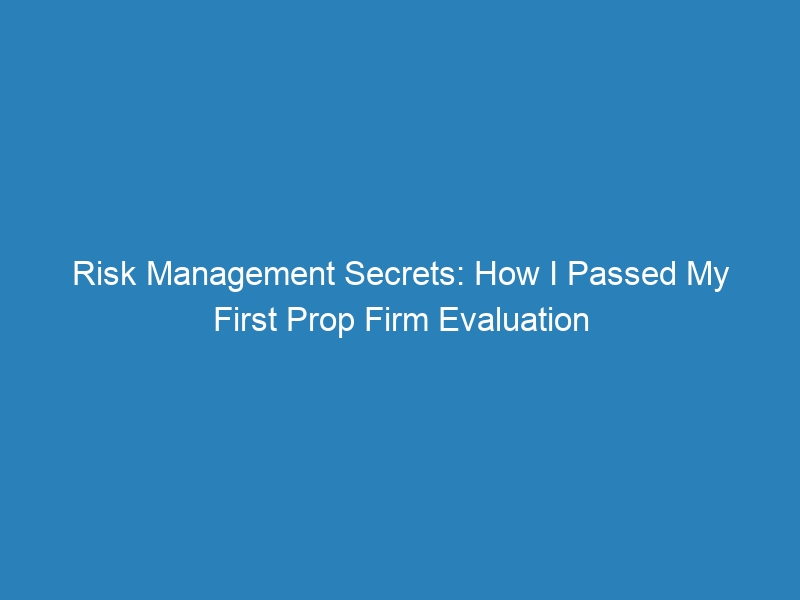Risk Management Secrets: How I Passed My First Prop Firm Evaluation

Navigating the world of prop firm evaluations can indeed be daunting, particularly for aspiring traders eager to secure funding. At the core of this journey is the essential skill of **risk management**—a game changer that can significantly impact your chances of success.
This article delves into the intricacies of prop firm evaluations, emphasizing the importance of effective **risk management strategies**. You will uncover common **pitfalls to avoid**, learn from shared experiences, and acquire valuable **tips** to help you approach your first evaluation with confidence.
Whether you are just starting out or seeking to refine your trading approach, this guide is crafted to equip you with the knowledge necessary to thrive in the competitive landscape of trading.
What is a Prop Firm Evaluation?
A prop firm evaluation is a comprehensive assessment process designed to assess your ability to manage risk and execute trading strategies effectively within proprietary trading firms. Throughout this evaluation, you will need to demonstrate your understanding of financial risk, refine your trading disciplines, and meet specific criteria to secure funding and showcase your trading performance.
This process tests not only your technical skills but also your psychological resilience in navigating market volatility and adhering to a structured trading plan.
The selection process generally involves multiple stages, including interviews, skill assessments, and real-time trading challenges. You will be evaluated on performance metrics such as profit targets, maximum drawdown, and consistency over a specified period.
A significant emphasis is placed on risk assessment, as firms seek traders who can pursue aggressive trading strategies while also maintaining a disciplined approach to mitigating losses.
By adhering to strict guidelines and demonstrating your ability to adapt, you can enhance your chances of success and ultimately gain access to substantial capital and trading opportunities.
The Importance of Risk Management
Understanding the importance of risk management is essential for achieving consistent trading success, especially in the unpredictable landscape of financial markets where market volatility can greatly affect trading performance.
Effective risk management requires assessing your risk tolerance and utilizing various techniques to mitigate potential losses while maximizing profit opportunities.
By integrating risk indicators into your trading strategy, you can enhance your decision-making process and optimize your risk exposure, ultimately leading to improved long-term results.
Why Risk Management is Crucial for Passing Evaluations
Risk management is essential for successfully navigating prop firm evaluations, as it directly impacts your ability to handle the challenges of the evaluation process while maintaining a favorable risk/reward ratio. A well-structured risk management plan enables you to control drawdowns and manage your trading psychology, which is vital for demonstrating your trading discipline and consistency.
By adhering to risk management principles, you increase your chances of not only passing the evaluation but also achieving long-term trading success.
Effective risk management serves as the cornerstone for making informed decisions under pressure, significantly influencing your mindset as a trader. When the fear of substantial losses is alleviated through sound strategies, you can concentrate on your evaluations without falling prey to emotional trading mistakes.
By systematically analyzing potential risks and aligning them with realistic profit targets, you can enhance your evaluation performance.
Consistent application of risk management techniques allows you to build resilience against drawdowns, fostering a healthier trading environment. This symbiotic relationship between managing risks and maintaining psychological fortitude ultimately leads to superior evaluation outcomes and sustained profitability in your trading endeavors.
Preparing for the Evaluation
Preparing for a prop firm evaluation necessitates a structured approach that integrates strategic planning and a solid understanding of market analysis to improve your trading performance.
This process involves developing a comprehensive trading plan that details your trading strategies and risk management techniques, ensuring you are well-equipped to navigate the challenges of the evaluation.
By prioritizing trading discipline, you establish a strong foundation for showcasing your capabilities as a trader and achieving success in your evaluation.
Key Strategies for Risk Management
Implementing key strategies for risk management is essential for you as a trader striving to enhance your performance and effectively navigate market fluctuations. These strategies include position sizing, capital management, and various trading techniques that emphasize risk mitigation, ensuring you are prepared for adverse market movements.
By adopting a structured approach to risk management, you can achieve a balanced risk/reward ratio and maintain psychological resilience amid trading challenges.
Understanding how to manage risk not only safeguards your capital but also fosters a healthier trading mindset, which is crucial for long-term success. Position sizing plays a critical role as it determines the amount of capital you allocate to each trade, helping to limit potential losses. Effective capital management allows you to set aside funds appropriately, ensuring liquidity and enabling swift responses to market changes. Employing trading techniques such as stop-loss orders can automatically protect you against significant downturns.
By integrating these elements, you cultivate a disciplined approach that enhances your overall trading psychology, reinforcing your confidence and decision-making abilities, even in volatile environments.
Common Mistakes to Avoid
Avoiding common mistakes is essential for traders aiming to excel during prop firm evaluations and achieve sustained trading success in the long run.
Many traders struggle due to a lack of discipline or emotional control, which often results in impulsive decisions that overlook effective risk management principles.
By recognizing and addressing these pitfalls, traders can reduce the likelihood of setbacks and enhance their overall evaluation outcomes.
Pitfalls that Can Lead to Failure
Identifying pitfalls that can lead to failure in prop firm evaluations is essential for traders who are committed to their success and effective risk management. Common pitfalls include neglecting risk management techniques, allowing a negative trader’s mindset to influence decisions, and failing to adapt to principles of behavioral finance. These factors can significantly compromise your evaluation performance and hinder your journey toward achieving trading success.
You must recognize that poor risk management tactics, such as taking overly aggressive positions or failing to implement proper stop-loss orders, often lead to substantial losses that could have been mitigated. An unprepared mindset, characterized by fear of missing out or overconfidence, can cloud your judgment during critical decision-making moments.
Understanding how cognitive biases—key elements of behavioral finance—affect your choices is vital; these biases can lead to inconsistent strategies and emotional trading. By prioritizing prudence and cultivating a resilient approach, you enhance your chances of excelling in evaluations and securing a more promising trading career.
My Personal Experience Passing an Evaluation
Reflecting on your experience in successfully passing a prop firm evaluation provides valuable insights into the critical elements that contribute to effective trading and risk management.
By dedicating yourself to refining your trading strategies and maintaining confidence as a trader, you can navigate the evaluation process successfully.
This journey not only enhances your performance metrics but also reinforces the importance of having a comprehensive risk management plan in place.
Lessons Learned and Tips for Success
In your journey through the evaluation process, several lessons learned can shape your approach to trading and risk management principles, ultimately leading to success in proprietary trading.
By focusing on continuous trading education and honing your evaluation skills, you can refine your strategies and develop a robust trading plan that prioritizes risk mitigation. Sharing these insights can assist others in navigating their own evaluation processes more effectively.
Understanding that emotional discipline plays a crucial role in trading decisions is a vital insight. It is essential to maintain clarity and composure, especially during high-pressure situations.
Implementing a well-defined trading routine not only fosters discipline but also allows you to review your performance regularly. Setting realistic goals and adhering to strict risk parameters ensures that unexpected market movements do not derail your progress.
By combining education, meticulous planning, and psychological resilience, you can significantly enhance your evaluation performance, give the power toing you to approach each session with confidence and a sense of purpose.
Frequently Asked Questions
What are some risk management secrets that helped you pass your first prop firm evaluation?
Some risk management secrets that helped me pass my first prop firm evaluation include setting strict risk limits, diversifying my portfolio, and regularly reviewing and adjusting my risk management strategy.
How important is risk management in passing a prop firm evaluation?
Risk management is crucial in passing a prop firm evaluation as it demonstrates your ability to manage and protect your capital, which is a key factor in becoming a successful trader.
What are some common mistakes that traders make when it comes to risk management?
Some common mistakes traders make include not setting clear risk limits, not following their risk management plan, and not diversifying their portfolio enough.
Do you have any tips for developing a strong risk management plan?
Yes, some tips for developing a strong risk management plan include assessing your risk tolerance, setting realistic goals, and regularly reviewing and adjusting your plan as needed.
How can I stay disciplined in following my risk management strategy during high-pressure trading situations?
To stay disciplined in high-pressure trading situations, it is important to have a solid risk management plan in place and to stick to it. It may also be helpful to take regular breaks and re-evaluate your plan if necessary.
What role does risk management play in long-term trading success?
Risk management plays a crucial role in long-term trading success as it helps protect your capital and minimize losses, allowing you to stay in the market and potentially reap greater profits in the long run.
Apply these risk management strategies when you start your journey with a funded trading prop firm account and increase your chances of passing the challenge.


Recent Comments